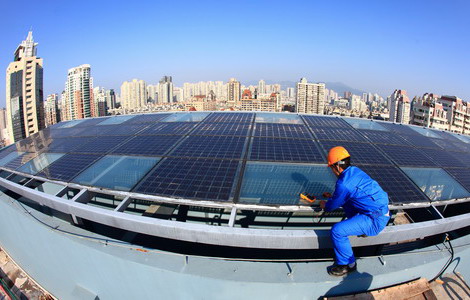China to unveil new energy consumption strategy
Updated: 2011-12-17 10:27
By Lan Lan (China Daily)
|
|||||||||
An engineer tests a photo-voltaic panel in Zhejiang province. Officials said China needs to achieve a better balance of economic growth, economic transformation, energy conservation and reduction of emissions. [Photo / China Daily]
Nation needs to better balance growth with the reduction of gas emissions

BEIJING - China is set to unveil a plan to impose controls on total energy consumption, said Zhang Ping, director of the National Development and Reform Commission (NDRC) on Friday.
The new plan, together with an energy-intensity target that has already been set for the period between 2011 and 2015, will provide policy guidelines for energy conservation and the reduction of emissions, said Zhang, without outlining a timetable.
"We need to achieve a better balance between economic growth, economic transformation, energy conservation and emissions reduction," said Zhang, at the NDRC's annual work meeting, which came on the back of an extended two-week conference on climate change, held in Durban, South Africa.
In Durban, emerging nations such as China were put under greater pressure to shoulder more responsibility for cutting emissions.
"It will be an unavoidable dilemma that China will have to deal with in the coming years - continuing the processes of industrialization and urbanization while coming under pressure to act more in cutting emissions," said Lin Boqiang, director of the China Center for Energy Economics Research at Xiamen University.
China has set a target of cutting energy intensity - which is calculated as units of energy for each unit of GDP - by 16 percent by 2015 from the 2010 level.
"The controls on total energy consumption will be tougher indicators than the energy-intensity targets, because there are loopholes through which local governments can achieve their energy-intensity targets by expanding the GDP base accordingly," said Lin.
The controls will be allocated to provincial governments. The plan will not only have an impact on GDP growth but will also influence the energy structure and price. "Setting limits on energy use means putting limits on GDP," Lin said.
Li Junfeng, deputy director of the Energy Research Institute affiliated with the NDRC, said China must switch to "healthy and qualified GDP", otherwise, it will take years to digest the "junk GDP" at a high environmental cost.
Earlier this month, China laid out detailed plans to control greenhouse gas emissions in the coming five years, with the national target allocated to provincial governments.
In addition, China will adopt more measures to save energy and reduce emissions by increasing the fines imposed for discharging pollutants such as nitrogen oxides, Zhang added.
Stabilizing prices
"Maintaining price stability remains the prime aim of the government's macroeconomic controls next year," said Zhang.
With relatively rapid economic growth and a lower rate of inflation, China's economy has been heading in the right direction this year, the beginning of the nation's 12th Five-Year Plan, he said.
He stressed the need to maintain stable growth next year, an issue that was highlighted at the annual Central Economic Work Conference earlier this week.
As a top priority, China will actively nurture new consumption frontiers and optimize the consumption environment to boost its consumption capability and demand.











